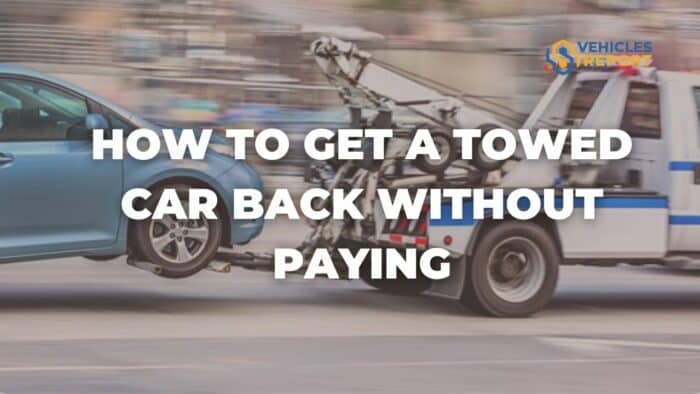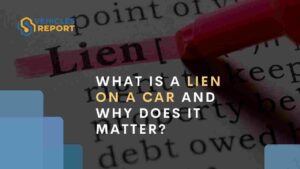Have you ever been in that awkward situation where you just came out of a building, party, or restaurant and discovered that your car had been towed away? This leaves nothing but a bunch of bills to settle, and no one wants to spend hefty amounts of money unnecessarily. The easiest way to get your towed car back without paying is to prove that it was wrongly towed. In this article, we will show you seven simple steps on how to get a towed car back without paying. With these steps provided by Vehicles Report, you can be sure of getting your car back without any form of payment.
Your car has been towed: what’s the first step to take?
Before doing anything else, you need to find out where your car was taken and why it was towed. With this information, you can do some research and see if you were really at fault or not. If you made no mistake, then you can follow our guide to learn how to get a towed car back without paying.
How to get a towed car back without paying: 7 simple ways
These are the steps to follow to get a towed car back without paying:
- Verify the towing procedure
- Contact the towing company
- Review local regulations
- Appeal to law enforcement
- Explore insurance coverage
- Seek legal assistance
- Negotiate a payment plan
Verify the towing procedure
When you discover that your car has been towed, it is crucial to verify the towing procedure to ensure that it was conducted lawfully. Start by carefully examining the area where your vehicle was parked for any visible signs or markings indicating authorized towing. Look for signs indicating restricted parking, fire lanes, or other designated no-parking zones. If you find no such signs or markings, it is possible that your car may have been wrongfully towed.
In addition to checking for signs, it is important to gather evidence of the towing procedure. Take photographs or videos of the parking area, noting any absence of proper signage. Documenting the condition of your vehicle, such as any damage or irregularities, can also be helpful. If there were witnesses present during the towing, try to obtain their contact information, as they may provide valuable testimony regarding the legitimacy of the towing. By gathering this evidence, you will have a stronger case if you decide to dispute the towing and potentially avoid the associated fees.
Contact the towing company
After the first step is completed, the next step on how to get a towed car back without paying is to contact the towing company. You need to hear what they have to say about the whole situation and know what to do from there. When you are ready to reach out to the towing company, gather all relevant information, such as the date, time, and location of the towing incident. Politely inquire about the reason for the towing and ask for any evidence or documentation they may have to support their actions. Make sure that the conversation is carried out in a completely calm and respectful manner, explaining your situation and providing any pertinent details that may help resolve the issue.
During your conversation, you can explore potential options for negotiating a reduction or waiver of the towing fees. In some cases, towing companies may be open to finding a compromise, especially if there is a misunderstanding or extenuating circumstances.
Review local regulations
Another tip to remember is to understand the local regulations surrounding towing in the state where you live. This is crucial when attempting to retrieve a towed car without paying. In different regions, there may be specific guidelines and laws that towing companies must follow, which can impact your options and potential recourse. For example, in California, the California Vehicle Code (CVC) outlines the procedures and requirements for towing vehicles. So, for residents in California, familiarizing themselves with these regulations would help them determine if any violations occurred during the towing process.
In California, the CVC states that towing companies must provide proper notice before towing a vehicle, which includes specific information such as the reason for towing, contact details, and the location where the vehicle has been taken. Failure to comply with these requirements means the towing company is guilty of a misdemeanor and could provide grounds for disputing the towing fees. Additionally, the CVC establishes maximum rates that towing companies can charge for their services, including towing, storage, and administrative fees. Being aware of these rate limits can help you ensure that you are not being overcharged.
Are you buying a used vehicle?
Have you checked if the vehicle you’re interested in has been previously damaged, abandoned, and probably towed away? With our VIN check service, you can easily verify the overall condition of the vehicle before payment is made and gain access to the following information:
- Accident history
- Auction records with more than 10 photos
- Sales history
- Damage records
- Vehicle specifications
- Lien and loan records
- Theft records
- Ownership history
- Title-brand records
- Warranty information
- OEM maintenance schedules
- Service history, and more
With our concise vehicle history report, you can determine any vehicle’s reliability at used car dealerships and make the right pick. Don’t complete that purchase without knowing the history and records of the vehicle.
Appeal to law enforcement
Have you reviewed the local regulations? If you are, then you can move on to appeal to law enforcement if the car was towed by law enforcement. Begin by gathering evidence that supports your case, such as photographs or witness statements, and present it during the appeals process. If you can demonstrate that the towing was unjust or that there were extenuating circumstances, you may have a chance to have the fees waived or reduced.
It’s crucial to familiarize yourself with the specific procedures and requirements for appealing a tow in your jurisdiction to increase your chances of a successful outcome. Remember to remain polite and respectful when dealing with law enforcement officials to maintain a constructive dialogue throughout the process.
Explore insurance coverage
One option to consider when trying to retrieve a towed car without paying is to review your insurance policy. Take the time to carefully examine the coverage provided by your insurance plan, as some policies include provisions for towing expenses. If your policy includes roadside assistance or towing coverage, it can significantly alleviate the financial burden of retrieving your vehicle. While this may not completely eliminate the fees, it can serve as a valuable resource for reducing the overall cost.
If your insurance policy does cover towing expenses, contact your insurance provider to understand the specific terms and conditions. They can guide you through the process and provide information on how to file a claim for reimbursement. Keep in mind that certain limitations or deductibles may apply, so be sure to inquire about any potential out-of-pocket expenses. Exploring your insurance coverage is an important step that may help lessen the financial impact of reclaiming your towed car.
Seek legal assistance
Seeking legal assistance is a crucial step if you believe your car was towed unlawfully. Consulting a lawyer who specializes in towing and impound laws can provide valuable guidance and support. They will assess the circumstances surrounding your case, review relevant documentation, and help you understand your legal rights and options. With their expertise, you can navigate the complex legal landscape, potentially challenging the towing and impound fees, and seek a resolution that is fair and just.
It is important to remember that legal assistance may come at a cost and that outcomes are not guaranteed. However, by engaging a knowledgeable attorney, you can increase your chances of finding a favorable solution and protecting your rights in cases where you believe the towing was unjust or in violation of the law.
Negotiating a payment plan
In cases where you are unable to pay the full amount upfront, contact the towing company or impound lot and discuss the possibility of setting up a payment plan. While this option does not eliminate the fees, it can provide temporary relief and allow you to retrieve your vehicle while managing your finances.
While getting a towed car without paying can be a challenging endeavor, it is essential to approach the situation with careful consideration of the legal, financial, and ethical implications, as explained in this article. Verifying the towing procedure, understanding local regulations, and exploring alternatives such as negotiating or appealing can increase your chances of finding a solution. Remember to be aware of the potential consequences of each approach and seek legal advice if necessary. If you need to get a vehicle history report for a used vehicle, make sure to get a VIN check with Vehicles Report.








